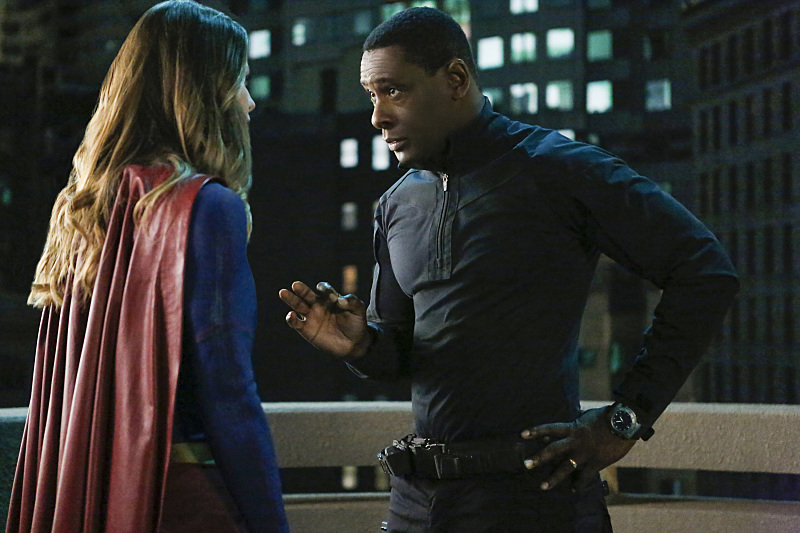In the latest episode of Supergirl on The CW, the screenwriters use the alter ego of DC Comics’ Martian Manhunter to discuss the Black experience in modern America.
In DC comics lore, the character Martian Manhunter, also known as J’onn J’onzz, is, well, obviously Martian. However in the television series, when he takes human form he trades in his green skin for the face of a Black man. For all the non-blerds out there, the producers did something very smart with Martians in the Arrowverse — the name for DC Comic shows on The CW — by making all the human forms of Martians distinctly African-American, played by African-American actors. J’onn J’onzz is played by actor David Harewood of Showtime’s Homeland fame, and is often a pivotal character in discussing matters of race or prejudice on the popular series. The thing about these characters is that they’re born psychics and shapeshifters, so technically they could be played by any actor. That’s why an actor like Harewood getting this role is a great way to add diversity to a series that could’ve been an all-white character set. It also doesn’t hurt that Harewood is a staunch supporter of civil rights.
Munter Magic. #InTheChair#SupergirlCW pic.twitter.com/n7I5ANaYeP
— David Harewood (@DavidHarewood) March 6, 2018
While other comic properties such as Black Panther display Black excellence on the silver screen, shows like Black Lightning and Supergirl use their Black characters to discuss the experiences of people who are descendants of the diaspora from Africa now living in America. On the latest episode, the titled character’s sister asks J’onn — director of a covert intelligence organization in the U.S. who’s also known by his human alias Hank Henshaw — to have dinner with him and his father, played by Carl Lumby. While discussing a number of issues usually not talked about in the Black community, such as dementia, Hank Henshaw is asked by this particularly white woman why he chose the face of a man who is Black. He says it wasn’t a choice but a tribute to the real Hank Henshaw, who died saving his life from a man who was prejudice against aliens. When asked the second and more poignant question of why he kept that face, since he could be anyone he wants, J’onn (as Hank) answers to the effect that he shouldn’t have to live in a world where he should have to change his face. For the show’s audience, he chooses to be unashamedly Black.
Really enjoying working with @CarlLumby on the show. We have great rapport on set and I look forward to our days together. ??♥️??#Supergirl #MartianManhunter #CW #DC pic.twitter.com/DreQyqogyi
— David Harewood (@DavidHarewood) April 18, 2018
It’s so important that young children of color not only see people that look like them on the screen, but have someone that echoes their experience in this nation. Both the writers at CW and Harewood as an actor consistently use Hank Henshaw/J’onn J’onzz to discuss fears of prejudice in this world that divide us all. From the general phobia that builds in the population in learning that Superman and Supergirl aren’t the only aliens living amongst them, to the fear of man against man that’s based around the melanin in someone’s skin, Supergirl defies being a typical weekly serial of fighting the bad guy every week. The show discusses the ugly side of humanity; our fears of the unknown, left unchecked, lead us to committing horrible acts of violence and isolating people who should be our neighbors and friends. In a recent article for The Guardian, Harewood uses his experience as a native Black man of London to discuss the treatment of Blacks who moved to the UK at the behest of the government and the subsequent racism and civil rights issues they faced. He builds the story around his grandmother Mazie, who is the matriarch of his family. His story is a familiar one because he addresses one of the many similar stories of Blacks around the globe who never quite fit in and were always abused as second class citizens.
Wrote this in the cab on the way to the airport. Thanks to everyone at the Guardian for allowing me to express my feelings on this. Means a lot. ✊?
I’ll fight for the Windrush generation – their treatment has been shameful | David Harewood https://t.co/4CV0z0GyPg
— David Harewood (@DavidHarewood) April 17, 2018
While some people argue about the color switching of their favorite characters, it is important we applaud comic book authors and screenwriters for doing just that. They are using their platform and medium to spearhead inclusion with the reimagining of classic characters from our youth.

In the modern retelling of these stories, it’s more than just a generic PSA like the one featured above that have obscure characters of ethnic origin. People in these comics of different races, religions, and cultural backgrounds have a rich backstory that current readers can identify with. Properties like Supergirl are growing with the expanded consciousness of their fans. They are creating a platform to discuss diversity across mediums, exposing a more inclusive way of thinking to all.
In a world where Blacks are still fighting for equality, it is important they see characters that reflect their collective experience and reinforce the need for us to do better as a society.
